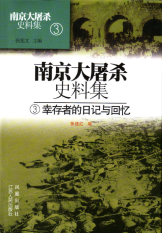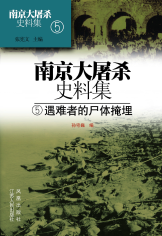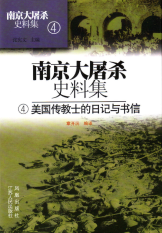
主要责任者: 马振犊
责任方式: 等编
出版者: 凤凰出版社;江苏人民出版社
出版地: 南京
字数: 442 千字
页码: 1-483
开本: 32
中图分类号: K265.210.6
分辑名:②南京保卫战
语种:中
定价:28.00
出版时间:2005-07
丛书多卷书否:是
丛书名:南京大屠杀史料集
丛书责任者:张宪文 主编
书目简介:本册工具书是南京大屠杀史料集之一,共收录151条词条。

主要责任者: 张连红
责任方式: 编
出版者: 凤凰出版社;江苏人民出版社
出版地: 南京
字数: 570 千字
页码: 1-612
开本: 32
中图分类号: K265.606
分辑名:③幸存者的日记与回忆
语种:中
定价:34.00
出版时间:2005-07
丛书多卷书否:是
丛书名:南京大屠杀史料集
丛书责任者:张宪文 主编
书目简介:本册工具书是南京大屠杀史料集之一,共收录39条词条。
被引频次:24

主要责任者: 杨夏鸣
责任方式: 编
出版者: 凤凰出版社;江苏人民出版社
出版地: 南京
字数: 619 千字
页码: 1-662
开本: 32
中图分类号: ①D995②K152
分辑名:⑦东京审判
语种:中
定价:36.00
出版时间:2005-07
丛书多卷书否:是
丛书名:南京大屠杀史料集
丛书责任者:张宪文 主编
书目简介:本册工具书是南京大屠杀史料集之一,共收录90条词条。
被引频次:57

主要责任者: 王卫星;王卫星,李斌
责任方式: 编;等译
出版者: 凤凰出版传媒集团:江苏人民出版社
出版地: 南京
字数: 473 千字
页码: 1-469
开本: 32
中图分类号: K265.606
分辑名:(59)《东京朝日新闻》与《读卖新闻》报道
语种:中
定价:46.00
出版时间:2010-11
丛书多卷书否:是
丛书名:南京大屠杀史料集
书目简介:本册工具书是南京大屠杀史料集之一,共收录598条词条。
被引频次:6

主要责任者: 王卫星
责任方式: 编
出版者: 凤凰出版社;江苏人民出版社
出版地: 南京
字数: 658 千字
页码: 1-734
开本: 32
中图分类号: K265.606
分辑名:⑧日军官兵日记
语种:中
定价:39.00
出版时间:2005-07
丛书多卷书否:是
丛书名:南京大屠杀史料集
丛书责任者:张宪文 主编
书目简介:本册工具书是南京大屠杀史料集之一,共收录19条词条。
被引频次:43

主要责任者: 孙宅巍
责任方式: 编
出版者: 凤凰出版社;江苏人民出版社
出版地: 南京
字数: 369 千字
页码: 1-420
开本: 32
中图分类号: K265.606
分辑名:⑤遇难者的尸体掩埋
语种:中
出版时间:2005-07
丛书多卷书否:是
丛书名:南京大屠杀史料集
丛书责任者:张宪文 主编
书目简介:本册工具书是南京大屠杀史料集之一,共收录31条词条。
被引频次:9

主要责任者: 王卫星
责任方式: 编
出版者: 凤凰出版社;江苏人民出版社
出版地: 南京
字数: 504 千字
页码: 1-539
开本: 32
中图分类号: K265.606
分辑名:⑩日军官兵与随军记者回忆
语种:中
定价:32.00
出版时间:2006-01
丛书多卷书否:是
丛书名:南京大屠杀史料集
丛书责任者:张宪文 主编
书目简介:本册工具书是南京大屠杀史料集之一,共收录39条词条。
被引频次:11

主要责任者: 章开沅,刘家峰,王薇佳,黄怀玉
责任方式: 编译
出版者: 凤凰出版社;江苏人民出版社
出版地: 南京
字数: 385 千字
页码: 1-394
开本: 32
中图分类号: K265.606
分辑名:④美国传教士的日记与书信
语种:中
定价:24.00
出版时间:2005-07
丛书多卷书否:是
丛书名:南京大屠杀史料集
丛书责任者:张宪文 主编
书目简介:本册工具书是南京大屠杀史料集之一,共收录43条词条。
被引频次:27

主要责任者: 王卫星,雷国山
责任方式: 编
出版者: 凤凰出版社;江苏人民出版社
出版地: 南京
字数: 360 千字
页码: 1-374
开本: 32
中图分类号: K265.606
分辑名:⑾日本军方文件
语种:中
定价:24.00
出版时间:2006-01
丛书多卷书否:是
丛书名:南京大屠杀史料集
丛书责任者:张宪文 主编
书目简介:本册工具书是南京大屠杀史料集之一,共收录101条词条。
被引频次:30

主要责任者: 张生
责任方式: 编
出版者: 凤凰出版社;江苏人民出版社
出版地: 南京
字数: 484 千字
页码: 1-505
开本: 32
中图分类号: K265.606
分辑名:⑥外国媒体报道与德国使馆报告
语种:中
定价:29.00
出版时间:2005-07
丛书多卷书否:是
丛书名:南京大屠杀史料集
丛书责任者:张宪文 主编
书目简介:本册工具书是南京大屠杀史料集之一,共收录268条词条。
被引频次:47